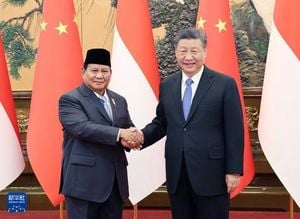Thailand's economic outlook for 2024 appears cautiously optimistic as authorities implement various strategies to navigate global uncertainties. Following several challenges, including the pandemic's aftereffects and inflationary pressures, the country's GDP is projected to stabilize under the government's prudent fiscal policies.
According to the Bank of Thailand, the GDP growth rate is expected to range between 3.5% and 4% for 2024. This forecast holds significance as it indicates resilience amid fluctuated global economic conditions. Inflation, which peaked at over 6% earlier, is anticipated to ease, reflecting the government's efforts to manage price stability and support consumer spending.
"We believe the economy is on the right path to rebounding, especially with increased tourist arrivals boosting service sectors," said Rattanaporn Suwan, Chief Economist at Krungsri Securities. The tourism sector, which significantly contributes to Thailand’s GDP, is gradually recovering, thanks to the return of international travelers.
Looking to boost foreign investment, the government has taken steps to encourage business activities aimed at attracting foreign entities. It has also focused on nurturing local startups, particularly those leveraging technology and digital solutions. Thailand 4.0, the government’s flagship initiative, aims to propel the economy through innovation and technology adoption.
Government officials have emphasized their commitment to enhancing the ease of doing business, with initiatives to streamline regulations. "Our goal is to create an environment where businesses can thrive and contribute to economic growth," stated Finance Minister Arkhom Termpittayapaisith.
Exports will also play a pivotal role as the country aims to diversify its trading partners and reduce dependence on traditional markets. The Ministry of Commerce reported initiatives to explore new markets, especially within ASEAN and beyond, capitalizing on the Regional Comprehensive Economic Partnership (RCEP).
Despite these positive signals, analysts caution about potential risks, including geopolitical tensions and trade policy changes from key partners like the United States and China. Investment sentiment may be swayed by global economic trends, requiring vigilance from policymakers.
"Thailand must remain adaptable to shifts not only locally but also on the international stage. It needs to reinforce trade relationships with economies showing promise," Rattanaporn added.
Another noteworthy aspect of Thailand's economic strategy is the commitment to sustainability. The government’s Green Economy Plan aims to transition the country toward sustainable practices, emphasizing renewable energy development and sustainable tourism.
All these combined efforts are geared toward supporting Thailand’s post-pandemic recovery. Many economists share the sentiment echoed by the Prime Minister, who remains positive about the nation’s economic resilience. "We will continue to focus on strengthening the foundation for our economy, ensuring it can withstand future shocks," he remarked during the recent press conference.
Individuals within the sector remain hopeful as they gear up for the upcoming fiscal year, noting signals of consumer confidence returning. With investments pouring in from both domestic and foreign sources, coupled with government support, Thailand's economy seems poised for careful yet definitive recovery.
While challenges lie ahead, including potential supply chain disruptions and fluctuated commodity prices, the path forward appears mapped out through collaborative efforts between the public and private sectors. Stakeholders await to see if the forecasts materialize as planned, closely monitoring indicators of recovery throughout 2024.



